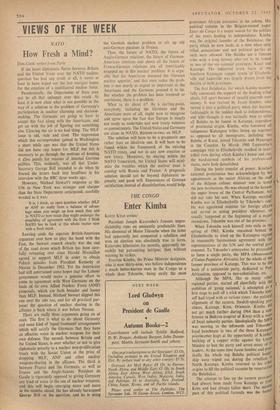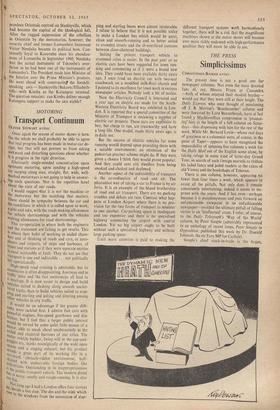THE CONGO
Enter Kimba
KEITH KYLE writes:
President Joseph Kasavubu's famous unpre- dictability runs on eminently predictable lines. His dismissal of Moise Tshombe when the latter had apparently just conquered a rebellion and won an election was absolutely true to form. Kasavubu hibernates for months, apparently im- mobile but patronising intrigue; then without warning he strikes.
Evariste Kimba, the Prime Minister designate, who is now thirty-nine, was before independence a much better-known man in the Congo as a whole than Tshombe, being easily the most
prominent African journalist in the colony. His political column in the Belgian-owned paper Essor dtt Congo is a major source for. the politics of the years leading to independence. Kimba was the original founder of the Balubakat, the party which he now leads, at a time when only tribal associations and not 'political parties as such were allowed. The Baluba are a famous 'tribe with a long history who are to he found in two of the six colonial provinces, Kasai and Katanga. The industrial work force of the Southern Katangan copper towns of Elisahcih- ville and Jadotville was largely drawn from the Baluba of both provinces.
The first Balubakat, for which Kirnba success- fully canvassed the, support of the leading tribal chiefs, fell apart because of squalid quarrels over money. It was• revived by Jason Sendwe, who turned it into a political party when this became fashionable in the sudden dash to independence, and who thought it was tactically wise to unite all Baluba to be found in Katanga, regardless of provincial origin. Kimba, who favoured all indigenous Katangese tribes lining up together as opposed to all immigrants, including the Baluba of Kasai, joined Tshombe and Munongo in the Conakat. In March 1960 Lumumba's campaign visit to Elisabethville resulted in inter- tribal riots during which Kimba's house and tie', the hard-earned symbols of his professional status, were both demolished.
During the hasty transfer of power, Kimba!s national prominence was acknowledged by his appointment as the senior African on the stuff of the Belgian cabinet minister sent to instal the new institutions. He was elected to the Senate, the upper house of the Central Parliament, but did not take his seat. When Katanga seceded.' Kimba was in Elisabethville by Tshombe's side He was appointed minister for foreign alfairg and served as acting president whenever, :as usually happened at the beginning of a major showdown, Tshombe was out of the province.
When Tshombe took himself into exile in die spring of 1963, Kimba remained behind in Elisabethville to wind up the Katangese regime in reasonably harmonious agreement with the representatives of the UN and the central gov' ernment. To Tshombe's annoyance, he proceeded to form a single party, the MPA (Mouventetti d'Union Poptilaire Africain), for the whole of the former province of Katanga. This was to be the basis of a nationwide party, dedicated to Pan' Africanism, opposed to neo-colonialism. etc.
Although the MPA, like so many other regional parties, started off cheerfully with the ambition of 'going national,' it attempted as a first stage to pull off a trick which Tshombe self had toyed with at various times: the political alignment of the eastern, Swahili-speaking pro" vinces, Katanga, Kivu, Orientale. Kimba d"1 not get much further during 1964 than a con' ference in Bukavu (capital of Kivu) with a mass of local minority parties. Ideologically the MO
was moving to the leftwards and Tshombe's loyal henchmen in two of the three Katangese provincettes leapt at the opportunity of Kimba's
backing of a copper strike against the Union Miniere to ban the party and arrest many of It' leaders. At the same time Jason Sendwe and pr's'`'
tically the whole top Baluba political leader' ship were wiped out during the rebellion in,
North Katanga. Kimba returned to his triba' origins to fill the political vacuum by resurreeli° the Balubakat.
The attempt to line up the eastern proving' had always been made from Katanga or fro"'
Kivu and had always fallen short. The missing, part of this political formula was the footle', province Orientale centred on Stanleyville, which had become the capital of the ideological left. After the rugged suppression of the rebellion in Orientale by the mercenaries, however, the security chief and former ,Lumumbist lieutenant Victor Nendaka became its political boss. Con- sistently loyal to Kasavubu since his abandon- ment of Lumumba in September 1960, Nendaka was the actual instrument of Tshombe's over- throw as he had been one of the instruments of Lumumba's. The President made him Minister of the Interior over the Prime Minister's protests. He went ahead with constructing the Swahili- speaking axis — Stanleyville / Bukavu/ Elisabeth- Ville—with Kimba as the Katangese terminal. The question remains: can Kimba deliver enough Katangese support to make the axis viable?































 Previous page
Previous page